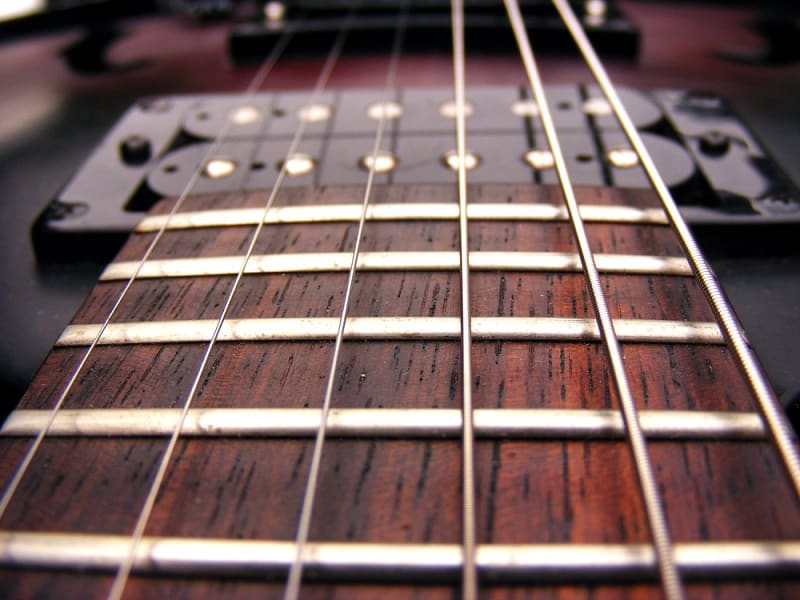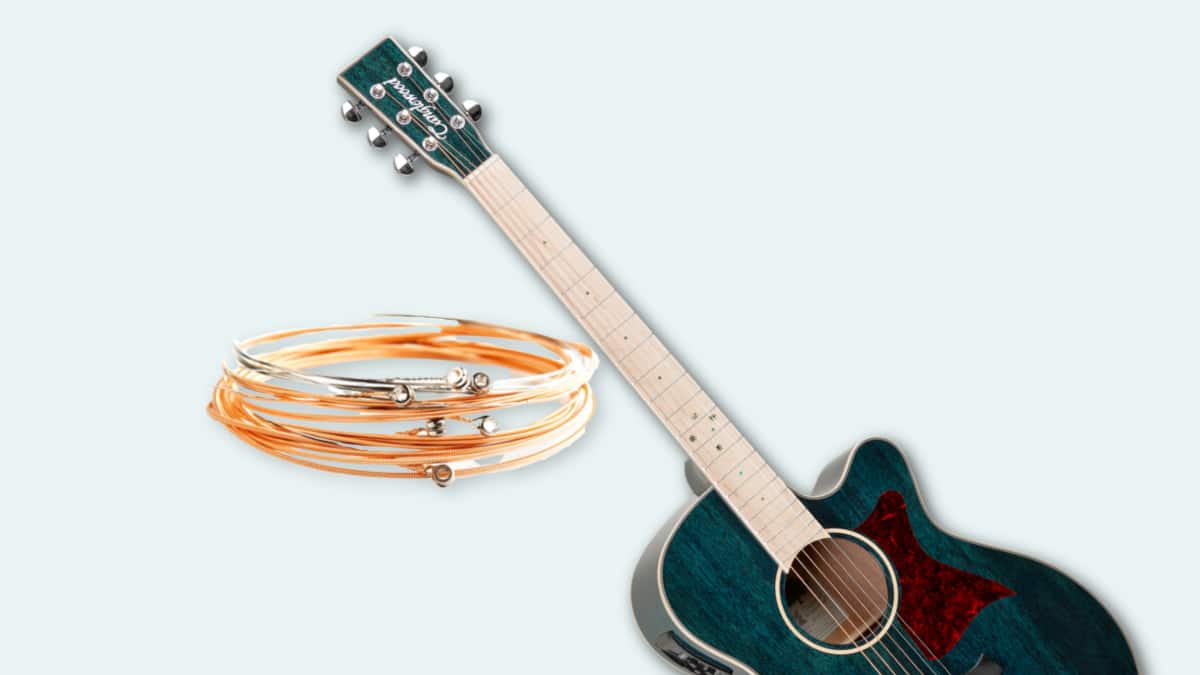You already know that the age and condition of your guitar strings can change your sound.
But what about the thickness of your strings?
The first time I bought guitar strings, I was just given 9-gauge strings without being asked. So after that, I always bought 9’s.
I was happy with my sound for a long time. But when I started playing in a band, I wanted more of a hardcore sound, and a fellow guitarist suggested increasing my string gauge.
It made more difference than I thought!
Today I’ll share both the downfalls and benefits of thicker guitar strings with you. From there, you can decide if going up a gauge is right for you.
String Gauges – An Overview
String thickness is often ignored. Many guitarists just keep using the same gauge as the strings that came on their guitar!
And when we go to buy strings, often they just give us “the standard” gauge.
Does it matter?
If you’ve been playing with the same old gauge forever, it may not be a huge deal.
But if you want to improve your tone or playability, it’s worth considering!
What String Thicknesses Do You Get?
Strings come in a wide variety of thicknesses. The number you see refers to the thickness of the thinnest string (high E string) in a set. They’re measured in increments of 1/1000th of an inch!
Common gauges include:
- 0.008 (also called 8-gauge)
- 0.009 (9-gauge)
- 0.010 (10-gauge)
- 0.011 (11-gauge)
Strings thinner than 8-gauge are considered to be very light. Thicker than 11-gauge is considered very heavy.
Those with sensitive fingers can also usually purchase half gauge strings. For example, 0.0085 or 0.0095.
You may also find mixed gauge strings. The top three strings are heavier gauge, while the bottom three are lighter gauge. This gives you a mix of robust tone and easy playability.
Mixed gauge strings aren’t used as much overall. But Jimi Hendrix favored this style!
How Does String Thickness Affect Sound?

This can get a little technical. The three factors here are volume, warmth or tone, and sustain.
All of these are beefed up with thicker strings.
Light gauge strings have a lighter sound.
Heavy gauge strings have a heavier sound. They’re louder, warmer, and have better sustain. These three factors all contribute to a great sound!
But they may not be for everyone–I’ll elaborate further down.
5 Benefits of Thicker Guitar Strings
Do you feel like your current string gauge may be too light? Here are some benefits of using thicker guitar strings that may convince you to switch.
1) Thicker Guitar Strings Hold Their Tuning Better
Thicker strings maintain their tension better than thin ones. They won’t lose tension as easily when constantly played.
This is a big benefit if you do a lot of string bending or you just play hard. Nobody wants to tune their guitar before every song!
Thicker guitar strings are also an excellent choice if you play a baritone guitar or like to use alternative tunings. They don’t become as slack as thinner strings would when down-tuned.
2) Thick Guitar Strings Have a Fuller, Warmer Tone
Thinner strings have a lighter, more trebly tone as they vibrate on a higher frequency. Thicker guitar strings have a more robust, beefy tone thanks to their lower vibrational frequency.
This isn’t going to be a benefit for everyone! But if you like a fuller, warmer tone, you may prefer heavy strings.
Light gauge strings will offer a cooler, twangier tone. This is great for country music guitars, or sometime pop, but may not be ideal for tough rock or metal.
On the other hand, if you choose extremely thick strings like 13s or above, you’ll get a much darker, deeper tone.
3) Thicker Guitar Strings are Slightly Louder
When you pluck a thicker string, it contains more kinetic energy than a thinner one. This energy is transferred to the sounding board and manifests as plenty of volume.
You’ll need to pluck lighter strings with more force to create the same volume.
On electric guitars, this may not be as important. Because you’re plugged into a little amp, you can control your volume electronically.
But it makes a big difference on an acoustic guitar. If you’re playing unplugged, thicker strings will give you a volume boost.
Related Post: The Best Yamaha Acoustic Guitars
4) Thick Guitar Strings are Harder to Break
Naturally, thicker strings take more force to break than thin strings. If you break a lot of strings, consider using a thicker gauge!
5) Thick Guitar Strings Have More Sustain
Sustain means how long the note rings out when you play it. It’s all about how long your strings vibrate.
Thicker guitar strings have a greater mass than thinner ones. This means they take longer to stop vibrating after you’ve plucked or strummed them.
Longer vibration = better sustain!
This would benefit guitarists who want to play lead solos. It might not matter so much for playing in a worship band or around the campfire.

Are There Disadvantages to Thicker Guitar Strings?
The benefits of thicker guitar strings are many. But there are some potential downsides too. Thick guitar strings can be:
- Tough on the fingers
- Harder to bend
- Harder to play with speed.
How to Choose the Right Gauge of Guitar Strings
Choosing the right gauge usually comes down to personal preference. You’ll need to consider both tone and playability when choosing.
It’s also a good idea to actually try other gauges out on your regular guitar.
Some questions to ask yourself when changing strings:
- Are the strings easy on your fingers?
- Can you bend and slide easily?
- Are chords easy to hold?
- Do they feel like they may break easily?
- Do the strings sound good?
- Is the tone in line with your style of music?
What Gauge Strings Should a Beginner Use?
In the beginning, playability will trump tone. Beginners should stick to lighter gauge strings. Heavy gauge strings can be almost unplayable for inexperienced fingers!
Most guitars come with 9-gauge strings on them straight from the store. These work well to learn with.
Once you’ve developed calluses and you can play without pain, you can consider going up a gauge.
What Gauge Strings Should an Experienced Guitarist Use?
Experienced guitarists may select their gauge based on tone rather than playability. Increasing your string gauge can help pump up your tone and sustain.
Playability will be a factor if you play hard or use a lot of vibrato or string bending.
Does your playing style cause you to break strings often? You may need a hybrid string set that offers both great tone and playability.
Who Should Use What?
Choose Light Gauge Strings If You:
- Are a beginner
- Haven’t developed calluses on your fingers
- Play a guitar with a very thin neck
- Have a Floyd Rose tremolo system
- Prefer a light, trebly sound
Choose Heavy Gauge Strings If You:
- Break strings often
- Want a more solid sound
- Play unplugged often
- Want better sustain
- Have callused fingers
Final Thoughts
Have you changed your string gauge to get the benefits of thicker guitar strings? Remember that your guitar may need a professional adjustment afterwards.
Going up a gauge can result in a more robust sound, which is especially great for rock and blues artists.
Beginners and guitarists using vibrato and string bending may prefer a light gauge.
It may be a good idea to try both and see what you prefer! When trying a thicker string, give it a week or two of consistent playing before you make your decision.
Thanks for reading!

